
"This record is about going through what I thought was going to be my only love, and then realising it’s simply my first," says 22-year-old Ashley Frangipane (best known by her musical moniker of Halsey), to me earnestly with unwavering eye-contact. Thoughtfully, she concludes that, "What I’ve learned from this is I need to trust me, and I need to choose me, no matter how much that makes everybody so mad to hear a woman decide to choose herself."
Earlier tonight, I followed a record label publicist through to the inner sanctum of Auckland’s Holy Trinity Cathedral. Outside awaited a couple hundred lucky fans who had been competing all week to win tickets to an exclusive acoustic performance - during which Halsey revealed that she is currently working on founding a non-profit organisation, and debuted a mash-up of top 40 pop songs to illustrate to attendees that they can all be sung over the same chords.
I’m ushered into a backstage room by Halsey’s tour manager, and before I can fully register my surroundings, a pink-haired force of energy bounces over to me saying, "Hi! I'm Ashley!"
On her first ever visit to New Zealand, Coup De Main caught up with Halsey to discuss her new album 'Hopeless Fountain Kingdom' and its accompanying mythology, the importance of not losing yourself to a "true love narrative", and other important lessons of the heart...
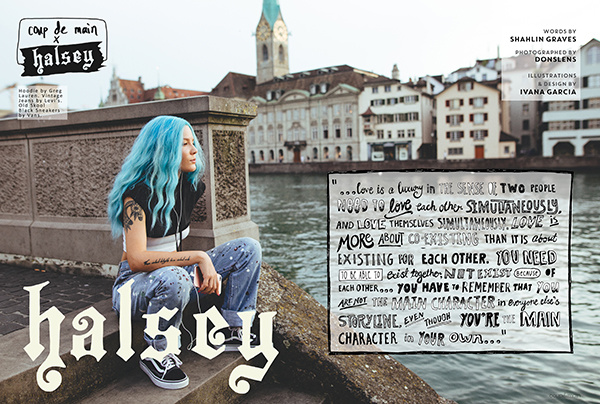
COUP DE MAIN: When I first talked to you back in 2015, 'Badlands' didn’t even have a New Zealand release date yet... but now 'Now Or Never' has gone Gold in NZ and you’ve finally come to visit us! So, an important question first: When are you going to come back to NZ and play a proper show for us all?
HALSEY: Holy shit. Soon! After Christmas, I will be back to play shows. "After Christmas"... that’s all I can give away.
CDM: I went to your August 2016 Madison Square Garden show--
HALSEY: You did?!
CDM: Yeah! Which at the end of, you broadcast a video teaser that concluded with the words, "You can find me in the kingdom..." That was ten months before 'Hopeless Fountain Kingdom' was released, but you already had your House Of Aureum bee imagery sorted and "HFK" is even the final word in your album booklet thank-yous on 'Badlands'.
HALSEY: Yes, because I’m an overachiever.
CDM: When did you first start planning this 'Hopeless Fountain Kingdom' world?
HALSEY: I think HFK kind of started right after I wrote ‘Badlands’. I already kind of knew that that’s what I wanted to do next. In making ‘Badlands’ I was exploring some concepts that I had never really explored before, and one of the things that came to mind was the HFK universe. So I think I’d already made my mind up that that was going to be the next concept that I wanted to explore. Especially since I saw how much fun I had creating the ‘Badlands’ universe. ‘Hopeless Fountain Kingdom’ kind of had promise to be a bit more rich and indulgent than ‘Badlands’, so I made my mind up that that would be where I wanted to go next. I already kind of know what the third album is going to sound like as well.
CDM: You’ve previously said that Room 93 exists inside of the Badlands. Does the Kingdom also exist within the same world as the Badlands?
HALSEY: Yeah, the Badlands is the mortal world to the Kingdom.
CDM: Do your 'Badlands' and 'Hopeless Fountain Kingdom' albums operate within the same era of time?
HALSEY: No, it’s a different timeline - the Badlands exist in the mortal world, and the Kingdom is kind of like an underworld. The story of 'Romeo and Juliet' originates from the Greek myth of Orpheus. Orpheus was the son of a God and a muse, and he had a voice so powerful it could move heaven and earth. He got married, and on his wedding night his virginal bride [Eurydice] was killed [by vipers] and got condemned to the underworld - which is not hell, it’s kind of like a purgatory in between. So since he had this voice that could literally move rock and soil, he tunnelled into the underworld and walked up to Hades and was like, 'Give me back my lover.' And Hades was like, "Okay, sure, but you have to: a) Sing for me, and if it moves me you can have her, and then; b) Once you get her, you have to take her away but you can’t look back. She’s going to be behind you, but you can’t look back at her. If you look back, she’s going to be stuck here." So he sings for Hades, and melts his cold, old, dead God heart, and gets his lover. They’re on a boat travelling through the river of Styx, making their way back to the mortal world, and she’s behind him crying. She’s like, 'Why won’t you look at me? You’re going to leave me here!' And he just can’t take it anymore and he turns around to look at her as they’re breaking through to the mortal world, and he looks back too soon, and she’s damned to the underworld forever. That’s the myth that laid the groundwork for the Italian opera that later turned into William Shakespeare’s ‘Romeo and Juliet’. So ‘Hopeless Fountain Kingdom’ is kind of like this underworld, in a way.
CDM: And you have your own mythology for that as well, because there’s a prophecy concerning Luna and Solis?
HALSEY: Yeah. Luna and Solis are the only two children born of the Hopeless Fountain Kingdom. They’re the only two natural births to ever occur in the Kingdom, so they’re like these precious tokens, because they were created out of love in a place where love couldn’t exist. So there’s a prophecy, there’s a fountain in the centre of the Kingdom, and in the fountain there are two koi, a sun carp and a moon carp. They’ve been chasing each other in a circle for eternity, and legend has it, once they catch up with one another, love will be able to exist in the kingdom again and people will be able to have more babies, like Luna and Solis. So Luna and Solis are kind of like this prophecy, they’re meant to represent the fish in the fountain, which is where the ‘hopeless fountain kingdom’ comes from, because the fish never catch each other, so it’s the hopeless fountain. In the story, they’re kept apart because the people of the Kingdom fear what will happen if they were to ever consummate their love. But they fight through it - they don’t know about the prophecy until much later. And then, essentially, Luna just decides to choose herself, and stop chasing Solis around in circles for the rest of eternity.
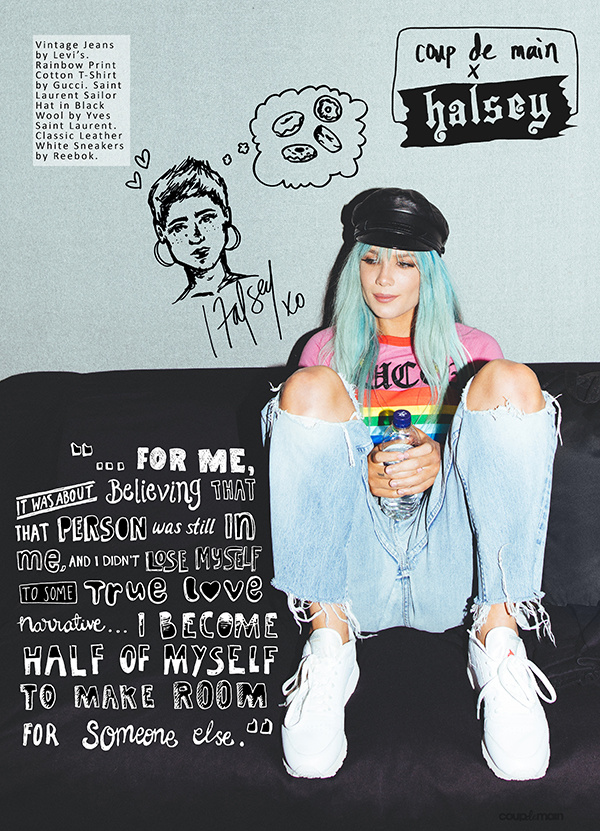
CDM: As Ashley Frangipane, do you visualise your Halsey and Luna Aureum alter-egos as Matryoshka Russian nesting dolls? Or more like pieces of a jig-saw puzzle that all fit together?
HALSEY: That’s really interesting. I think, probably a bit more like Russian nesting-dolls.
CDM: What would be the big doll on the outer surface?
HALSEY: The outer layer is probably-- I guess it depends on whatever character I am at any given time. It depends what I look like, and what I’m doing, and what my mentality is. I’m definitely a product of my environment for sure. My work makes me, I don’t make my work. As I was writing ‘Hopeless Fountain Kingdom’ and I wrote this strong female character who was choosing herself over feeling like she was owed to someone else, and feeling like she was indebted to someone else as part of some shitty prophecy, I think I started to believe it, as I was writing that character. Making art is a really powerful thing, because I’m very sensitive to it. Whoever I’m writing myself as, is often who I become, so it’s been important for me to focus on writing myself as a confident and capable woman. I think that I do find myself in times writing myself as a character that… You can kind of hear through a bit of ‘Badlands’ and through a bit of ‘Hopeless Fountain Kingdom’, you can imagine what I would’ve been like in that week or in that month when I was writing that song. Like, writing ‘Haunting’ or writing ‘Control’, I’m a bit more vulnerable, and maybe a bit more confused? It’s important to write those songs, but I have to write myself out of them as well. I kind of write myself into a hole, and then I have to write myself out of it. It’s a vicious cycle, I guess.
CDM: As you just mentioned before, with your 'Hopeless Fountain Kingdom' album you flip the script on 'Romeo and Juliet' and portray a female heroine who chooses her love for herself over her love for another. As Halsey, you’re constantly re-interpreting male narratives, even if it’s just small lyric changes in your covers of DJ Khaled’s 'I’m The One' or Justin Bieber’s 'Love Yourself', and that’s one of my favourite things about you - your fight against stereotypes. Why is it so important to you to represent and present these non-traditional narratives?
HALSEY: We live in a world where a lot of female songs have been written by men, for women. Which means that subconsciously, I think, a lot of men have been controlling the narrative of women in pop-culture, whether it’s men writing female characters on television, or men writing pop songs for female artists. In 2017, it’s been really great to see that kind of break - e.g. ‘Orange Is The New Black’ with female writers, and to have people like Julia Michaels, or Sia, or Charli XCX writing hit songs for female pop artists. It’s great to see a female perspective in that way. Sometimes I think it’s important to inject myself into that narrative. Also, as a woman who doesn’t necessarily bow to traditional female roles, sometimes I don’t change it, and sometimes I just step in and take the place of the male character. Where like in ‘Hopeless Fountain Kingdom’ I take the place of Romeo, or like if I cover The Weeknd’s ‘Often’, I keep the ‘she’ pronouns intact, and it’s to show that just because I’m a woman doesn’t mean I can’t represent this male narrative. So I try to do that sometimes as well.
CDM: It normalises it.
HALSEY: Yeah, I think so.
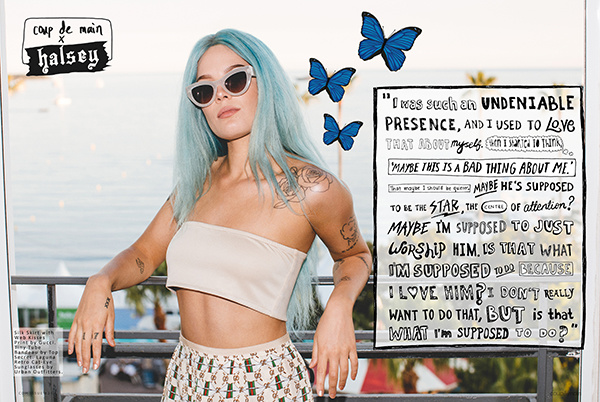
CDM: I’ll always remember, one of the things you said to me the first time we talked was: "The person who you are with does not define you. And it’s the most important thing that girls need to learn these days, be it a man or be it a woman - whoever you are in love with, your partner does not define you. Because at the end of the day you need to be your own best friend."
HALSEY: Definitely.
CDM: That’s such an important life-lesson, and you continue that theme from 'Badlands' over to 'Hopeless Fountain Kingdom'. There can be a lot of pressure in relationships, especially if there’s an imbalance of power between two people, to think that you need to change yourself to make your partner like you more. What do you think are warning signs that people should be wary of and consider to be alerts as to losing sight of themselves as their own person?
HALSEY: For me, it was when I started to see myself through someone else’s gaze. When I started to care more about how they wanted me to dress, or what music they were listening to - whatever I would put on in the car, or the house. I slowly watched it creep into my music as well. I have a lot of fans who would say, 'I can’t imagine Halsey making music without Lido.' But it was really important for me to not. And on ‘Hopeless Fountain Kingdom’ especially. I did do some records with him, just because it provoked a powerful emotional response in the song, but the most important thing for me was executive producing my own record, because I got to a point where I felt like I couldn’t do anything without him. I got to a point where I’d sit up at night and be like, ‘What do people like about Halsey? Is it the parts of me? Or is it the parts of him that make up this project?’ So for ‘Hopeless Fountain Kingdom’ it was really important for me to step away from that and be like, ‘I can make music that’s successful and make music that’s popular and well-received, and at the end of the day, authentic, and a good reflection of me, without him.’ You have a record like ‘Now Or Never’, or a record like ‘Bad At Love’ which is the next single, or a record like ‘Strangers’, and he didn’t lay a finger on them, and those are arguably some of the most well-received songs off the record. And that’s really vindicating for me--
CDM: And it was YOUR choice.
HALSEY: Yeah, exactly! So that was really special. I think people need to be careful… Your opinion of yourself can’t be a looking-glass opinion in the sense of like, ‘Who am I, in the way that they see me?’ You have to be who you are, not through their gaze. I always tell this story about when we first broke up and I was in my house - a house that I got with him, where we lived together. I’m by myself, in my room, on my side of the bed. I’m sitting on the edge of the bed and I’m thinking about getting dressed - something as simple as getting dressed. I’m like, <says softly> ‘What am I gonna wear today? What do I like to wear? Because he likes when I wear this... I’ve been dressing like this for a while…’
CDM: You’ve got to find yourself again.
HALSEY: Yeah. I was like, ‘What the hell do I like to do? Who the hell am I when I’m not worried about his opinion? Or when I don’t have him to say, "Babe..." Should I wear this dress? Or should I wear this? What colour should I get my nails? Or what should we order for dinner? Where should we go?’ God, I needed to learn to be able to make a fucking decision on my own.
CDM: Ashley! You don’t belong to no man.
HALSEY: Exactly! And that was another thing, too, that was difficult. I had such a nostalgia for a person I felt like I used to be. I was looking at photos, or looking at myself when I was nineteen, and being like, "Who was that girl that wrote ‘Hurricane’? Because I don’t feel like her right now. Have I ever been that person, who really felt like that? Who really felt like I 'don’t belong to no city / don’t belong to no man’?" Someone who was willing to claim being a one night stand as her own choice, not because she’s unlovable, but because she can’t be contained. I was like, ‘Was I ever really that person?’ Because it’s hard to believe right now. So for me, it was about believing that that person was still in me, and I didn’t lose myself to some true love narrative... I became half of myself to make room for someone else.

CDM: I literally feel a physical pain in my heart every time I hear you sing, "But I still let everyone down when I change in size," in 'Devil In Me'. I think they might be my favourite lyrics of yours that I’ve ever heard; they’re really powerful words. Are emotional warfare and control power-plays the worst thing about relationships?
HALSEY: I think so. I think it can be difficult as well, because of how ingrained those roles are. The reason I chose to play Romeo is because that’s what I was in the relationship. I was the dominant one. I was the breadwinner. I was, most of the time, the decision-maker. I was the loud one in a room. I was the one that introduced myself to everybody while he was quiet and more reserved. After a while, I started to catch glances from across the room of him, maybe being embarrassed that I was loud, that I dressed the way that I did, or that I took up so much space. I was such an undeniable presence, and I used to love that about myself. Then I started to think, ‘Maybe this is a bad thing about me.’ That maybe I should be quieter, maybe he’s supposed to be the star, the centre of attention. Maybe I’m supposed to just worship him. Is that what I’m supposed to do because I love him? I don’t really want to do that, but is that what I’m supposed to do?
CDM: Do you think that two people in a relationship can ever truly both be equals at the same time?
HALSEY: I do think so. I think I’ve had experiences since with people, and not quite as a dramatic of a love story, but relationships that have gone well enough where we just are both fans of each other, and we’re supporting each other, and I’m eager to see them succeed. It was such a revelation for me the first time I started exploring other relationships after the breakup, and I was with someone, and I was dressing however I wanted to, or doing my hair in a certain way, or speaking in a certain way. Or we’re at the dinner table and someone says something I don’t agree with, and I’m arguing back, instead of being quiet and not picking a fight. Watching people be like, ‘That’s her,’ and this is the person that I like. I remember being like, ‘Whoah, hold on, you’re gonna just like support me, and want to see me be myself and have my own personality?!’ I realised how wrong I was all the time.
CDM: So love can endure? If you find the 'right' love?
HALSEY: I think so. I think that love is a luxury in the sense of, two people need to love each other simultaneously, and love themselves simultaneously. Love is more about co-existing than it is about existing for each other. You need to be able to exist together, not exist because of each other. I think you have to remember that you are not the main character in everyone else’s storyline, even though you’re the main character in your own. It’s a big lesson to learn, just remember that the people around you and the people you love have their own narrative where they’re the main character, and you’re just a secondary character in their story. So if you demand to be the main character in someone else’s story, it’s not going to go well. You need to be two storylines simultaneously existing in the same universe, you can’t be one story with two characters. One of you has to be the protagonist. You need to be two storylines, not one.

CDM: 'Angel On Fire' paints a very lonely portrait. The music industry is notorious for lives of excess, but does very little to protect the mental health of its creatives. Is loneliness the root of hopelessness?
HALSEY: I think so. I definitely think so. I think that for me it is, at least, subjectively. I think I have been a very lonely person, and that’s why I’m kind of an escapist - I write about places. I think if I create a place and I can conquer it, metaphorically, it helps me in my real life. I feel like I’ve conquered something if I can conquer a place. A lot of the time I think I’m feeling very much alone in that fight of escapism…
CDM: Your places are like mental states of mind.
HALSEY: Definitely. I went so literal with it on ‘Hopeless Fountain Kingdom’, where I even bothered to say, “Hopeless isn’t a place, nothing but a state of mind,” almost as a reminder to myself. I think it can feel very much like you’re stuck somewhere. The Badlands were definitely that for me, for sure. The Badlands was entirely representative of feeling trapped in this mundane and repetitive mentality of wasteland in my head.
CDM: What do you think is beyond hopeless? Can you ascend from hopeless to happiness?
HALSEY: Yeah, definitely. I think that from hopelessness you learn context - being in a low place gives you context of being in a better place. When I first started this record cycle, someone said to me in an interview once, 'Are you worried people are going to think you’re arrogant?’ I was like, ‘No.’ They were like, ‘You’re not worried people are going to think you’re arrogant? You’re speaking about self-love, and you can be very articulate. You’re not worried it’s going to come across as pretentious?’ I was like, ‘Listen. When I made this album, I was in a very low place. I was in a very, very vulnerable place, and I fought through the trenches to be as confident as I am now. If confidence is a place, it took me a long time to get here, and I’m not going anywhere.’ It was that kind of thing-- I grew from hopelessness to catharsis. To being like, ‘Okay, I’ve been through this before, I know all the warning signs, I know how horrible it was to be there, I’m going to stay in a better place.’ I think it was really important for me to go through that though, not even as a writer, as a 20-something year old woman. I definitely had to go through that to be like, ‘It’s okay to fucking like yourself.’ Even if, <mockingly> ‘Are you worried people are going to think you’re arrogant?’
CDM: It’s so infuriating that someone said that to you. That it really is true that there’s a societal notion that you’re a difficult woman if you present yourself as knowing exactly what you want.
HALSEY: Definitely. There’s also an outrageous double-standard. I try not to read anything, but sometimes I’ll see comments on interviews of mine, and people will be like, ‘Ugh, do you hear how she talks? She’s so pretentious.’ It’s like, god forbid I’m articulate. God forbid I come into an interview knowing what I have to say. God forbid my message is defined in my head and I’m not some fucking clueless fool of a woman. God forbid I walk in assured of myself. Of course I sound fucking… They say, ‘Oh, it’s so self-indulgent.’ Yeah, of course it is, it’s sixteen songs about ME. Of course it’s self-indulgent, that’s the whole fucking point. <laughs> You know what I mean? I read that comment, ‘She sounds so pretentious, the way she talks. She uses such big words and tries to sound smart, and sounds like she knows everything.’ It’s like, well I am talking about something I’ve thought through a lot for the past six months. I’m talking about MY record that I created. Imagine what the alternative would be if I sat there and just didn’t know what I was talking about and tripped over my words. And then it would be, ‘Oh, she’s an idiot, she’s got nothing in her head. She has no substance, she’s stupid.’ So it’s definitely one of those situations where you cannot win. And if you can’t win either way, I’m going to choose to continue to be assured and confident, and sit in a room and not let anyone make me feel like I don’t know what I’m talking about. Especially when we’re talking about something I made.
CDM: God forbid you’re more than a copy-and-pasted press release.
HALSEY: God forbid I walk in and have opinions about something I’ve organically created from my own experience. God forbid I have advice for people that are going through something similar to me. The irony is that this record is very much about realising that I don’t know everything, as opposed to thinking I do. That’s very much what this record is about: going through what I thought was going to be my only love, and then realising it’s simply my first, in a very long story. If anything, this record is very much me saying, ‘I have no idea, and I’m still learning.’ But what I’ve learned from this is I need to trust me, and I need to choose me, no matter how much that makes everybody so mad to hear a woman decide to choose herself. I don’t care if that pisses you off. I have to do it or I’m going to die.

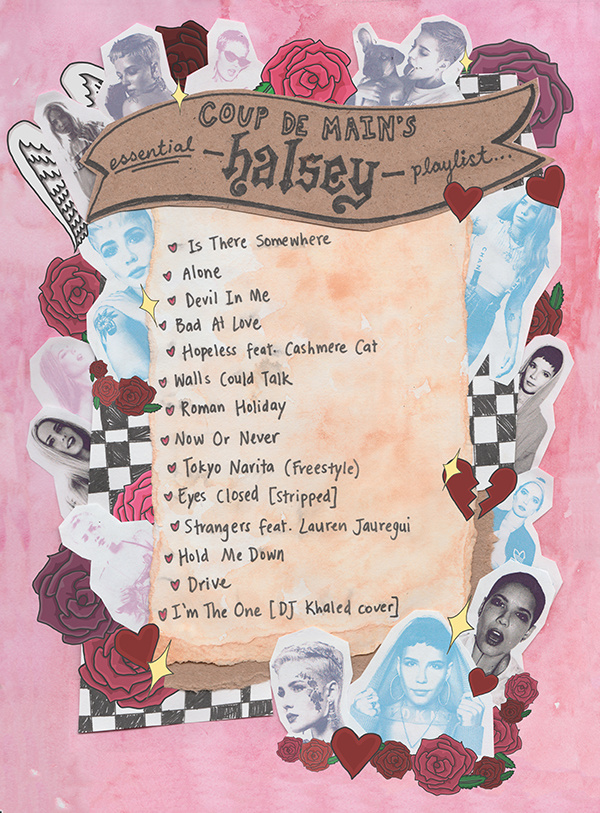
CDM Issue #21 is out now! Click here to read the full issue or here to pre-order a zine.
Halsey’s new album 'Hopeless Fountain Kingdom' is out now - click here to purchase via iTunes.
Watch Halsey’s 'Bad At Love' music video below...

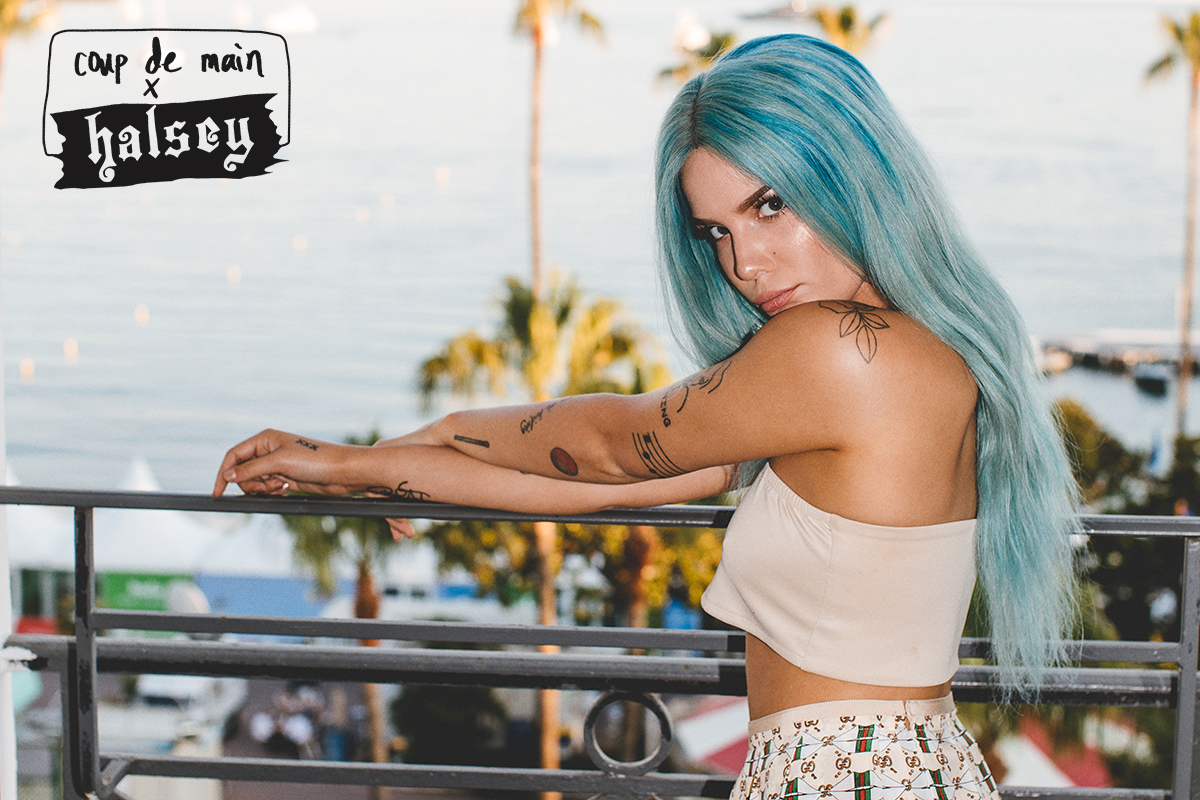

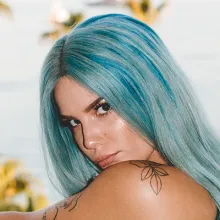 Halsey
Halsey